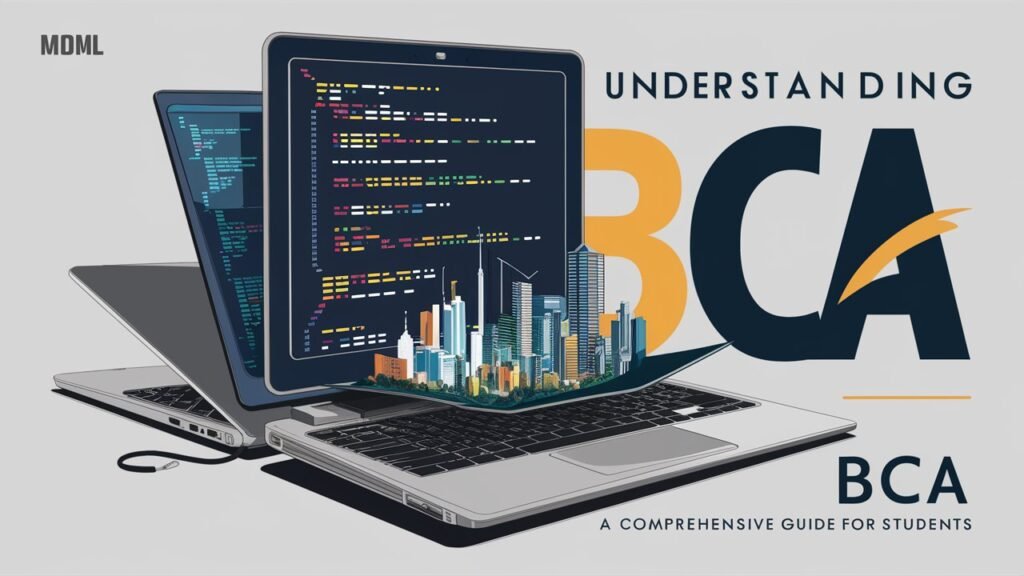Understanding BCA (Bachelor of Computer Applications): A Comprehensive Guide for Students

As technology continues to evolve rapidly, the demand for skilled professionals in the field of computer applications is on the rise. For students aspiring to build a career in IT, the Bachelor of Computer Applications (BCA) is an excellent undergraduate program that provides a solid foundation in computer science and applications. Here’s a detailed guide on what you need to know about pursuing a BCA degree.
1. What is BCA?
Bachelor of Computer Applications (BCA) is a three-year undergraduate degree program designed to equip students with a comprehensive understanding of computer systems, programming, and software development. The course covers various aspects of computer science, including programming languages, database management, networking, and web development.
2. Curriculum Overview
Core Subjects: The BCA curriculum is designed to provide a balanced education in computer science. Key subjects typically include:
- Programming Languages: Introduction to languages like C, C++, Java, and Python.
- Database Management Systems (DBMS): Understanding databases, SQL, and data handling techniques.
- Web Development: Learning about HTML, CSS, JavaScript, and web design principles.
- Computer Networks: Basics of networking, network design, and network security.
- Software Engineering: Principles of software development, project management, and testing methodologies.
Electives and Specializations: Depending on the institution, students may have the option to choose electives or specialize in areas such as artificial intelligence, mobile application development, or data analytics.
3. Skills Acquired
Throughout the BCA program, students develop a range of technical and soft skills, including:
- Programming Proficiency: Ability to write and understand code in multiple programming languages.
- Problem-Solving Skills: Analytical skills to troubleshoot and solve complex technical issues.
- Project Management: Skills in managing and executing software projects from conception to completion.
- Communication Skills: Effective communication abilities for teamwork and presenting technical information.
4. Career Opportunities
A BCA degree opens up a variety of career paths in the IT industry. Graduates can pursue roles such as:
- Software Developer: Designing and developing software applications.
- Web Developer: Creating and maintaining websites and web applications.
- System Analyst: Analyzing and improving computer systems and processes.
- Database Administrator: Managing and securing databases.
- Network Administrator: Overseeing network infrastructure and ensuring its efficiency.
Further Studies: For those interested in advanced studies, a BCA degree is a strong foundation for pursuing a Master of Computer Applications (MCA) or other specialized postgraduate degrees in IT and computer science.
5. Admission Process
Eligibility Criteria: Typically, students must have completed their higher secondary education (12th grade) with a focus on mathematics or computer science. Some institutions may also require an entrance exam or have specific cut-off criteria.
Application Process: The application process generally involves submitting academic transcripts, entrance exam scores (if applicable), and other required documents. It’s essential to check the specific requirements of the institutions you are interested in.
6. Choosing the Right Institution
When selecting a BCA program, consider factors such as:
- Accreditation: Ensure the college or university is recognized and accredited.
- Faculty Expertise: Look for institutions with experienced faculty members who bring industry knowledge and practical experience.
- Infrastructure: Evaluate the quality of labs, libraries, and other facilities that support your learning.
- Placement Opportunities: Research the institution’s placement record and industry connections to gauge potential career support.
7. Campus Life
BCA programs often include opportunities for students to participate in extracurricular activities, such as coding clubs, tech fests, and hackathons. These activities can enhance learning, foster teamwork, and provide networking opportunities with industry professionals.
8. Future Trends and Adaptability
The field of computer applications is dynamic, with new technologies and trends emerging regularly. Staying updated with industry developments and continually enhancing your skills through certifications and additional training can significantly impact your career prospects.
Conclusion
A Bachelor of Computer Applications (BCA) offers a robust foundation in computer science, opening doors to various career opportunities in the technology sector. By understanding the curriculum, developing key skills, and selecting the right institution, students can set themselves up for a successful career in IT. Embrace the opportunities that come with a BCA degree and prepare to navigate the exciting and ever-evolving world of computer applications.
